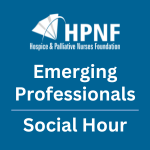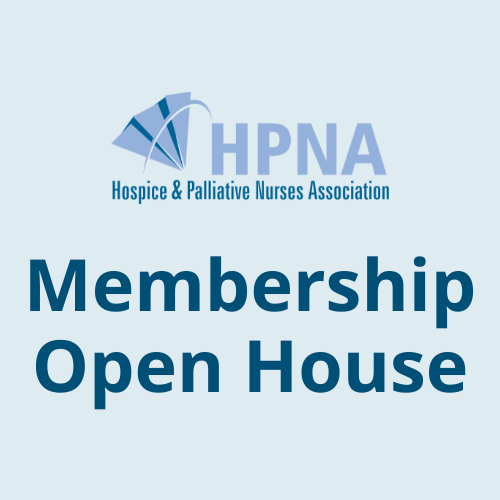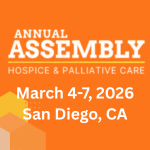HPNA
Advancing nursing expertise in hospice and palliative care through education, advocacy, leadership, and research.
HPNF
Supporting hospice and palliative research, education, and leadership development to advance expert nursing care.
HPCC
Advancing expert care in serious illness through state-of-the-art certification of continuing competency in hospice and palliative care and research.
-
Volume Discounts
Support your nursing care teams with volume discounts on HPNA memberships, educational resources, and HPCC certification exams.
-
Make a Difference
Support the future of hospice and palliative care nurses as they grow their knowledge, advance their careers, and respond to the ever-evolving needs of our communities.
-
Become Certified
Achieving a specialty hospice and palliative care certification from HPCC validates expertise in hospice and palliative care.

Upcoming Events
-

Emerging Professionals Social Hour: Finding the Flow in Your Work
Join HPNF Emerging Leader Scott Nguy, DNP, APRN, FNP-C, ACHPN® on Tuesday, January 13 for a virtual discussion on finding the flow in your work. Come unwind and connect with peers as we talk about finding purpose and growing as leaders in palliative care. It’s a space for honest conversation, shared experiences, and a little inspiration along the way.
-

February HPNA Membership Open House
Interested in learning more about a membership with HPNA? Already a member and want to learn more about utilizing your member benefits? Join HPNA for an open house to explore all that a membership has to offer.
-

Annual Assembly of Hospice and Palliative Care
The Annual Assembly of Hospice and Palliative Care, presented by the American Academy of Hospice and Palliative Medicine (AAHPM) and the Hospice and Palliative Nurses Association (HPNA), is a 3-day event that brings together more than 3,400 of your colleagues and peers to share research, clinical best practices, and practice-related guidance to advance the specialty and improve patient care.
-

State of the Science Symposium
Join fellow investigators to share and explore new research and innovative methods in hospice and palliative medicine. The 2026 State of the Science Symposium (SOTS), presented by the American Academy of Hospice and Palliative Medicine (AAHPM) and the Hospice and Palliative Nurses Association (HPNA), is being held as a full-day pre-conference symposium held prior the 2026 Annual Assembly of Hospice and Palliative Care on March 4, 2026, at the San Diego Convention Center in San Diego, CA.

HPNA Learning Center
The HPNA Learning Center allows you to access up-to-date, convenient, and self-paced learning modules with real-time test grading and printing of your NCPD certificates.
Our courses are developed based on current health care trends, clinical issues related to care approaches for the patient and their family, and practice issues related to and in collaboration with other members of the interdisciplinary team.
Go to My CoursesLatest News
-
HPNA and HPNF Announce 2026 Board of Directors
The Hospice and Palliative Nurses Association (HPNA) and Hospice and Palliative Nurses Foundation (HPNF) are pleased to announce the 2026 Board of Directors.
-
HPCC Announces 2026 Board of Directors
The Hospice and Palliative Credentialing Center (HPCC) is proud to introduce the 2026 Board of Directors.
-
HPNA Celebrates 40th Anniversary in 2026
The Hospice and Palliative Nurses Association is celebrating 40 years in 2026! This historic moment calls for a nostalgic walk down memory lane for HPNA members.
-
HPNA endorses bill to address nursing faculty shortage, modernize nursing education
The Hospice and Palliative Nurses Association (HPNA) joined more than 50 organizations in endorsing the Future Advancement of Academic Nursing (FAAN) Act, which was introduced this week by Senators Jeff Merkley (D-OR) and Adam Schiff (D-CA), and Rep. Lauren Underwood (D-IL).
-
HPNA Urges Administration Leaders to Address Telehealth Prescribing Flexibilities
HPNA joined more than 100 organizations in urging administration leaders to address upcoming expiration of telehealth prescribing flexibilities.
